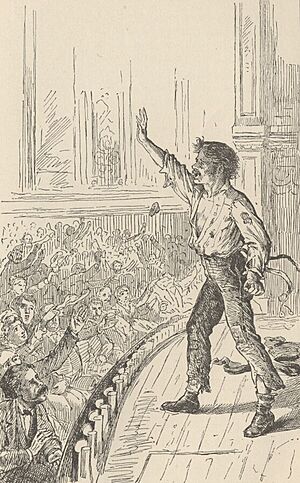Henry Clay Dean facts for kids
Henry Clay Dean (born October 27, 1822 – died February 6, 1887) was a Methodist Episcopal preacher, lawyer, speaker, and writer. He was known for speaking out against the American Civil War and the government of President Abraham Lincoln.
Contents
Early Life and Education
Henry Clay Dean was born in Fayette County, Pennsylvania, on October 27, 1822. He was named after the famous Kentucky senator, Henry Clay. Henry was one of three sons of Caleb Dean, who worked as a stonemason. He went to Madison College in Pennsylvania. After college, he taught for a while and also studied law.
On January 19, 1847, Dean married Christiana Margaret Haigler. They had seven children together: John Willey, Charles Caleb, Henry Clay Jr., Mary Jermima, George James, Christiana Margaret, and Virginia Rebecca (who was called "Vinnie").
Career Highlights
In 1845, Henry Clay Dean joined the Methodist Episcopal Conference of Virginia. He began preaching in the mountain areas of Virginia for four years. In 1850, he moved to Pittsburg in Van Buren County, Iowa. There, he continued to preach.
Thanks to the influence of George Wallace Jones, an early United States Senator from Iowa, Dean was chosen as the chaplain for the United States Senate on December 4, 1855. This was a very important role.
Dean was also a trustee for the Iowa Wesleyan College in Mount Pleasant, Iowa. He was allowed to practice law, but he didn't start until after the Civil War. He was a very talented public speaker. People often invited him to give lectures on many topics, including the Constitution and the Declaration of Independence.
Views on the Civil War
Henry Clay Dean held strong Methodist beliefs, which influenced his views before the Civil War. He was against slavery spreading into new territories. He disagreed with the Lecompton Constitution, which was written by people in Kansas who supported slavery. Instead, he supported the idea of "popular sovereignty" by Stephen Douglas, which meant people in a territory should decide on slavery themselves.
While Dean did not support slavery continuing, he believed that enslaved people should be freed over time. He thought the government should buy their freedom. In one of his writings, Dean suggested that the Civil War was started by powerful financial groups.
During the war, Dean spoke out strongly against President Lincoln's government. Because of his outspoken views, he was held for a short time. After he was released, he wrote a book called ‘Crimes of the Civil War.' This book was a very strong criticism of President Lincoln and his government's actions during the war.
Later Life and Legacy
After the Civil War ended, Dean became a spokesperson for the Democratic Party. He opposed the "Radical Republicans," a group that wanted big changes in the South. In 1867, he started supporting the idea of "soft money." This meant printing more paper money to pay off the national debt. Because of these ideas, he helped start the United States Greenback Party in the western states.
Dean strongly promoted the Greenback Party's ideas. He spoke out against the national banking system and criticized people who held government bonds. He also continued to strongly criticize Lincoln's actions during the war. He put many of his ideas into his book, Crimes of the Civil War and Curse of the Funding System (1869).
After the war, Dean also practiced law. He became known for taking on cases for clients who were poor and couldn't afford legal help.
In 1871, Dean moved to a farm in Putnam County, Missouri, which he called ‘Rebel Cove.' He collected a very large library of books there, but sadly, it was later destroyed by fire.
Mark Twain's Description
The famous writer Mark Twain wrote about Henry Clay Dean in his book Life on the Mississippi. Twain described Dean as a brilliant speaker and a self-taught man.
Twain noted that Dean started poor and without much schooling. He educated himself by reading books while sitting on curbstones in Keokuk, Iowa. He would focus so deeply on his studies that he didn't notice the busy streets around him. Twain said that Dean's mind was like a well-organized library, where he could easily find any information he needed.
Twain also described Dean's appearance, saying his clothes were very old and dirty. But despite his appearance, Twain said that no one would guess the brilliant mind inside.
Twain called Dean a natural orator, meaning he was a born speaker. He became even better through practice. When Dean spoke during political campaigns, farmers would travel for miles to hear him. He always spoke about politics and never needed notes, because his words flowed like a volcano.

 | Kyle Baker |
 | Joseph Yoakum |
 | Laura Wheeler Waring |
 | Henry Ossawa Tanner |

